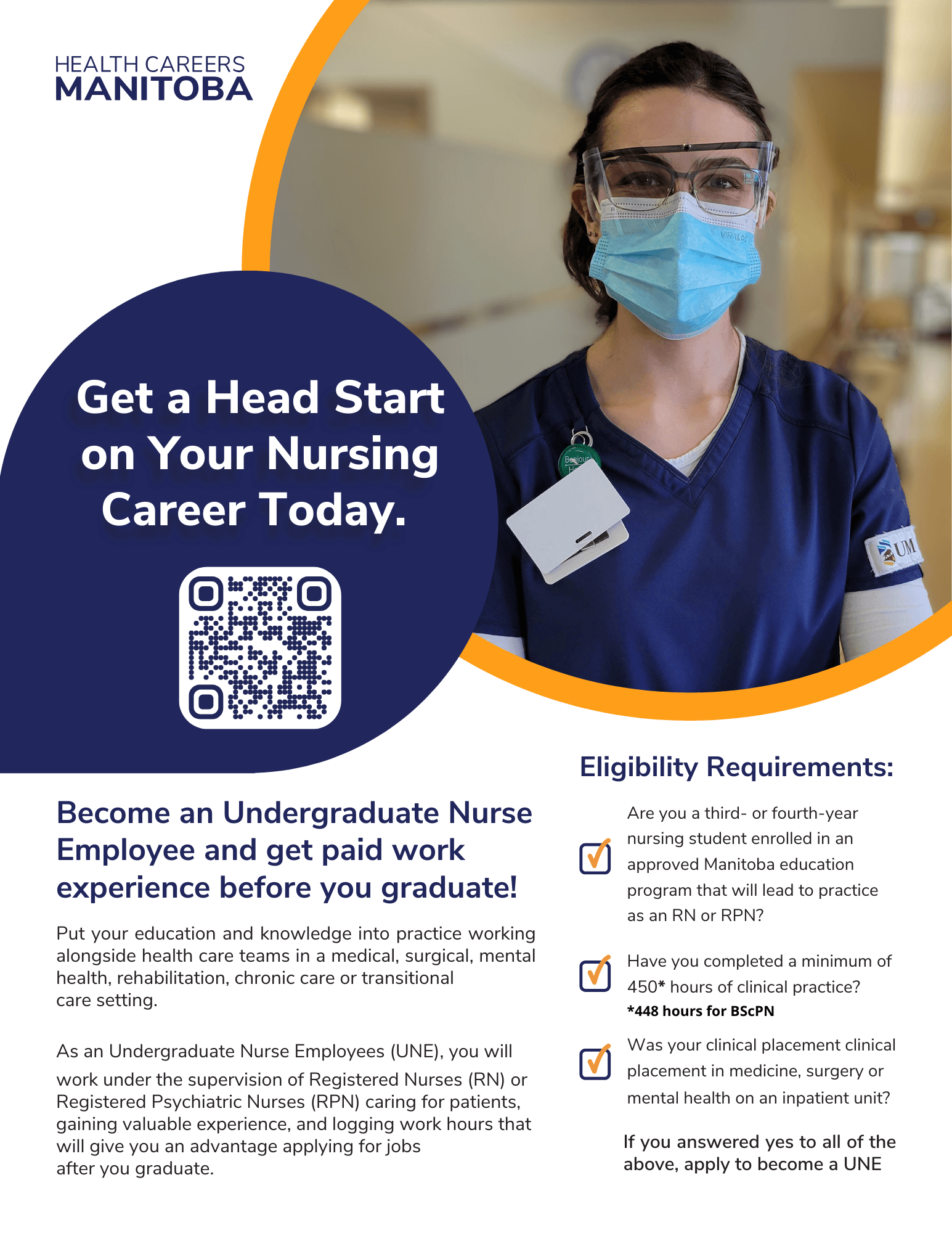Undergraduate Nurse Employee (UNE)
Get a head start on your Career in Caring.
Become an Undergraduate Nurse Employee!
Apply your education and knowledge, and work alongside health care teams in a medical, surgical or mental health setting.
Undergraduate Nurse Employees (UNE) work under the supervision of Registered Nurses (RN) or Registered Psychiatric Nurses (RPN) and are an important new addition to Manitoba’s diverse, collaborative and supportive healthcare teams.
As a UNE you will care for patients, gain valuable experience, and log working hours that will give you an advantage when applying for jobs after you graduate.
Get an early start on your career in caring!
The Opportunity
- A job in medicine, surgery or mental health, where you will put your education into practice, and strengthen your nursing knowledge and skills.
- Hours worked count toward your seniority, giving you a competitive advantage post-graduation.
- A competitive salary.
- Entitled to vacation and statutory holiday pay, earned on each cheque.
- Casual positions with a combination of day, evening and weekend shifts.
- Pick up additional shifts on short notice, potentially up to full-time during summer and the winter holiday season.
- Member of the Manitoba Nurse’s Union.
Requirements
- Open to third- or fourth-year nursing students enrolled in an approved Manitoba education program leading to practice as an RN or RPN.
- Minimum of 450 hours* of clinical practice completed.
- Completion of a clinical placement in medicine, surgery or mental health on an inpatient unit.
- A satisfactory Criminal Records Check including a Vulnerable Sector Search, Adult Abuse Registry Check and Child Abuse Registry Check
*448 hours for BScPN
Where to Apply
Interlake-Eastern Regional Health Authority
Northern Regional Health Authority
Prairie Mountain Health
Shared Health
Southern Health-Santé Sud
Postings:
Carman Memorial Hospital – #374966
Carman Memorial Hospital – #377306
Portage District General Hospital-Rehab Unit – #371548
Morris General Hospital – #368422
Winnipeg Regional Health Authority
Frequently Asked Questions
General FAQs
What is an undergraduate nursing employee (UNE)?
A UNE is a student in an approved nursing program leading to entry to practice as a Registered Nurse (RN) or Registered Psychiatric Nurse (RPN) who works in a health-care setting.
The UNE is an unregulated member of the inter-disciplinary team, and is supervised by an RN or RPN.
UNEs are hired into casual positions and are members of the Manitoba Nurses Union.
What are the minimum qualifications of a UNE?
To be hired as a UNE, an individual must be actively engaged in full or part-time studies in an accredited nursing program leading to an RN or RPN entry to practice.
The UNE must have successfully completed third year or be enrolled in third year and have a minimum of 450 hours* of clinical practice in an approved nursing education program.
Verification of clinical hours and evidence of the appropriate clinical placement is required. Students will be expected to provide this information and confirmation will be collected by the hiring manager at the time of interview.
In addition, eligible UNEs must have completed a clinical placement in a medical/surgical or mental health setting.. Ongoing verification of enrollment should be confirmed by managers quarterly.
*448 hours for BScPN
Which educational institutions are included?
Manitoba’s approved nursing programs for entry to practice as a Registered Nurse (RN) or Registered Psychiatric Nurse (RPN) are:
- Brandon University
- University of Manitoba
- Red River College Polytech
- Université de Saint Boniface
- University College of the North
How is eligibility confirmed by an educational institution?
Verification by educational institutions may be completed by using the Undergraduate Nurse Employee (UNE) Clinical Hours Confirmation form, or by providing documentation from your educational institution.
Hiring managers should collect the verification at the time of interview.
If a UNE is no longer enrolled in a recognized/accredited, are they able to continue working as a UNE?
No. When a student is no longer enrolled in a post-secondary nursing program, they are no longer eligible to be employed as a UNE.
This means that once a student completes all their educational requirements, including their practicum, they may no longer work as a UNE and must register as a Grad Nurse.
What is the UNE hiring process?
Hiring process policies may vary by site, however hiring managers will determine the best candidate for the position.
Are UNE positions available year-round?
Scheduled postings have been adjusted to reflect the educational institutions’ school years.
Previously approved casual UNE positions that have become vacant due to a UNE moving to a RN/RPN position can be reposted on that same unit, provided the circumstances on that unit have remained the same (i.e., stability of the unit, vacancy rate, etc.).
As UNE positions become vacant, re-approval to post the vacancy is not required. If a site is requesting to create new UNE positions for units that have not previously been approved for a UNE position, or additional positions on a unit, then a submission for approval is still required to be sent to the implementation committee. This can be done at any time of the year.
What are the pay and benefits for a UNE?
UNEs are hired at a competitive salary at Step 0 of the LPN scale. Additionally, vacation and statutory holiday pay earned on each cheque. UNEs are hired as a casual nursing employee, so they are exempt from receiving health-care benefits, but eligible for Workers Compensation.
How are UNE assignments determined? How is a UNE determined to be appropriate for a specific unit?
A hiring manger will consider the specific unit’s patient population and the level of acuity in the assignment, related to the UNE’s skill set.
Availability of appropriate supervisory resources to support mentorship on the unit is also a consideration, as is the ability of the unit to hire UNEs in pairs (at minimum) to ensure a supportive environment and collaborative learning environment.
Do UNEs working on the same unit need to work the same shifts?
No, if the unit’s supervisory model can accommodate two UNEs per shift, that can be scheduled, however it is not required. Hiring UNEs in pairs is intended to provide the UNEs with a colleague they can connect with and share this experience. Having more than one UNE on the unit will also facilitate the broader team in learning and understanding the role.
Can UNEs be replacement staff?
No. UNEs are unregulated providers and are not to be used as replacement staff for fully qualified RNs, RPNs or LPNs.
UNEs are hired as casual employees and often support units during high vacation time periods. They can be scheduled up to full-time hours and be called in on short notice within the unit they are employed.
Utilization and employment of UNEs shall not result in elimination or reduction of positions for all other classification of nurses, nor result in the reduction of the availability of additional available shifts, or a reduction in the hours that would otherwise be available for any other classification of nurses.
The UNE is accountable for providing safe patient care in accordance with their educational preparation and competency. The UNE is responsible for seeking consultation and guidance. The UNE is excluded from employment in a practice setting (e.g., unit) for the period of time that they are in a clinical placement as a student in that practice setting.
What shifts can a UNE work?
A UNE can begin by working days and/or evening shifts. To ensure UNEs continue to receive adequate support in their practice and appropriate learning experiences, the following criteria must be met for UNEs to be scheduled for night shifts:
- UNE has completed orientation to the specific site/ area of care and attended new employee orientation as applicable
- Has completed 155 hours of work in a UNE position working days/evening (13x 12 hour shifts; 20 x 8 hour shifts)
- Manager has reviewed the UNEs progress in the clinical area including feedback from the supervising nurse(s)/educator and determine UNEs readiness/suitability to work night shifts
- Appropriate supervising nurse is available to support the UNE on the night shift
- Approval from the manager is required for the UNE to be scheduled for night shifts
NOTE:
- UNEs may not be scheduled to work night shifts only
- UNEs in a full-time position and enrolled in a nursing re-entry program or bridging program may be scheduled for night shifts in between course
Supervision & Oversight
What is meant by direct and indirect supervision?
Direct supervision means that an RN/RPN or regulated health-care designate is present in the practice setting at the point of care and provides supervision “at the side of the UNE.”
Indirect supervision means an RN/RPN is available for guidance and consultation and oversight, but is not “directly by the side of the UNE.” The supervising RN/RPN must be readily available on the unit or in the same location where the care is being provided and must have the opportunity to observe the nursing practice as required.
Who is responsible for supervising UNEs on a daily basis?
Each UNE needs to be assigned a supervising RN/RPN at the beginning of each shift in a direct or indirect supervision relationship. The supervising RN/RPN, in collaboration with the UNE, is responsible for making a reasonable and prudent care assignment for the UNE.
What sort of patient care assignments can UNEs be involved with?
The nursing activities performed, and level of supervision required, are determined by legislation, standards of supervision outlined by regulatory bodies, educational preparation, practice setting, complexity of the patient level of risk involved, and competency of the UNE.
In collaboration with the UNE, the RN or RPN at the point of care has the responsibility to make a reasonable and prudent UNE Patient care assignment.
The UNE must not perform any nursing intervention that they have not attained competency in the nursing education program as per UNE job description.
The UNE must seek guidance and assistance when the complexity of the patient (client/resident) condition or care is beyond the competency of the UNE or the patient status changes.
The UNE:
- Must perform nursing care safely according to the knowledge, skills and abilities obtained in formal nursing education in collaboration with the RN or RPN
- Can be considered to perform reserved acts under the direct or indirect supervision of the RN/RPN and only after level of UNE competency and potential risk has been considered by the RN/RPN and has acquired knowledge and skills in their nursing education program.
For additional resources regarding assignment of care, please refer to:
What does someone in a supervisory role need to consider related to reserved acts or nursing interventions the UNE may perform?
The UNE must have attained competency in their approved nursing education program. The reserved acts and/or nursing intervention must be appropriate to the practice setting.
The RN/RPN at the point of care must determine the level of risk in the UNE performing the reserved acts and the supervision required.
Additional considerations include:
- Assessment of the patient population and their health-care needs.
- Nursing care required and reserved acts to be performed.
- Employer policies.
- Current established competencies of the UNE.
- The supports and resources available for supervision.
- Level of risk in the UNE performing the reserved acts.
- The RN or RPN still remains responsible for the supervision of the UNE for the overall provision of patient care.
To perform reserved acts, UNEs must be supervised either directly or indirectly in the practice setting by a Regulated Health Care Professional authorized and competent to independently perform and supervise that reserved act.
There is no staff member available to supervise a UNE to perform a skill/procedure that they have attained competencies for in their nursing education program. Can the opportunity be declined?
If the UNE’s assigned supervisor is not available to supervise the completion of the task, an alternate RN or RPN may be designated to supervise the UNE. If an alternate is not available, then the opportunity should be declined.
Working in the Unit
How does a UNE sign their name in a patient chart?
The UNE signs the chart as first name initial, full last name and UNE.
How does a UNE identify themselves to the patients/staff?
The UNE should introduce themselves by name and indicate that they are an Undergraduate Nurse Employee. They should also indicate who is their supervising nurse for that day.
Can UNEs process orders?
Yes, if the UNE’s basic education included order processing, they can process orders.
Can a UNE work year-round on our unit?
Yes, some facilities/sites choose to employ the UNE in a casual status position year-round. However, they must remain actively enrolled in an accredited nursing program.
A nursing student is completing a clinical placement on the unit and now wants to be a UNE on our unit. Is this allowed?
An individual may not be a student and a UNE on the same unit during the same timeframe.
A nursing student has applied to be a UNE on a particular unit where they also wish to do their senior practicum at a later date. Is this allowed?
An individual may not be a student (clinical placement/practicum) and a UNE on the same unit. An individual may not complete their senior practicum on a unit where they have been employed as a UNE. A UNE may work on units other than where they are doing their clinical placement. There may be rare instances that are reviewed on a case-by-case basis and that attempt to find solutions to barriers and support our learners.
Can UNEs provide supervision to other employees?
No. UNEs do not provide supervision to other employees, such as Health Care Aides, other UNEs or students.
Can a UNE be floated to a different unit?
No. The UNE is hired to a unit. They are not to be floated to different units.
Will the UNE be able to use their increment hours earned in their UNE position towards an increment in an RN or RPN position?
Yes. Casual incremental hours will transfer over to a part-time position as per the provisions of the collective agreement.
Is there a minimum number of hours that a UNE must work to remain employed?
Site policies may vary related to casual employees.
Is the UNE expected to provide resignation notice when they are no longer eligible to work as a UNE (i.e., are no longer actively enrolled in an academic program)?
Should the UNE no longer be enrolled in an approved nursing education for any reason other than graduation from the nursing program, they must inform their manager immediately.
What happens when the UNE graduates from their approved nursing education program?
The UNE should inform the manager when they are graduating. The manager should work with the UNE leading up to their graduation to assist in applying for positions in the health-care system.
When a UNE applies for a RN or RPN position, and meets the qualifications of the posting (i.e., is now a Graduate Nurse), the casual seniority that the UNE has accrued in the UNE position would be used as per Article 3509 for the purposes of Article 30 and only against other qualified casual MNU members and where there are no FT or PT applicants.
Can one individual hold multiple UNE positions?
No. A UNE can only hold one position, on one unit within a facility. They cannot hold positions at multiple facilities.
Can a UNE work overtime?
The UNE is eligible to work overtime and would be paid in accordance with the collective agreement.
Does the supervising nurse need to be the same for every shift?
The employers are looking at a way to provide the consistency of working with the same supervising nurse(s), as it will provide consistent support for the UNE as well as clarity for the supervising nurses. By maintaining the same supervising nurse for each shift, it will help improve the understanding of the full scope of the UNE’s capabilities and not just tasks, specifically in the beginning.
Resources
- UNE Welcome Package
- Clinical Rotation Hours Confirmation Form
- Clinical Rotation Hours Confirmation – Urgent Care (Note: This form is only for participants of the WRHA Urgent Care Pilot Project at Victoria Hospital, Concordia Hospital & Seven Oaks Hospital)
More Questions?
For more information contact the regional health authority where you would like to work.
Interlake-Eastern Regional Health Authority
[email protected]
Northern Regional Health Authority
[email protected] (The Pas, Flin Flon &
surrounding areas)
[email protected] (Thompson & area)
Prairie Mountain Health
[email protected]
Health Sciences Centre Winnipeg
[email protected]
Southern Health-Santé Sud
[email protected]
Winnipeg Regional Health Authority
[email protected]





